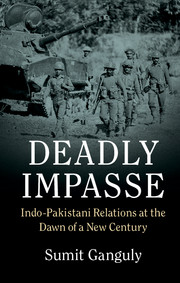Book contents
- Frontmatter
- Dedication
- Contents
- List of maps
- Preface and acknowledgments
- List of abbreviations
- 1 The rivalry revisited
- 2 Kargil and after
- 3 The troubled decade in Kashmir
- 4 The road to Operation Parakram
- 5 The composite dialogue and beyond
- 6 An extension of the rivalry
- 7 Policy implications
- In lieu of an epilogue
- Appendices
- References
- Index
5 - The composite dialogue and beyond
Published online by Cambridge University Press: 05 March 2016
- Frontmatter
- Dedication
- Contents
- List of maps
- Preface and acknowledgments
- List of abbreviations
- 1 The rivalry revisited
- 2 Kargil and after
- 3 The troubled decade in Kashmir
- 4 The road to Operation Parakram
- 5 The composite dialogue and beyond
- 6 An extension of the rivalry
- 7 Policy implications
- In lieu of an epilogue
- Appendices
- References
- Index
Summary
THE COMPOSITE DIALOGUE AND BEYOND
The precise factors that contributed to the so-called composite dialogue in 2004 remain unclear. However, based on the available evidence it can be argued that it was a combination of domestic Indian initiatives, some reciprocity from Pakistan, and American pressures that led to its onset. It might be recalled that Prime Minister Atal Behari Vajpayee had called for a renewal of the dialogue with Pakistan from Srinagar, the capital of the Indian-controlled portion of the state of Jammu and Kashmir, in April 2003. Pakistan reciprocated his offer and Prime Minister Mir Zafarullah Khan Jamali, in a speech at Quetta on May 18, stated that a dialogue with India was the only way in which outstanding differences would be resolved.
Despite the stated willingness to embark on this dialogue with India, it needs to be reiterated that the structural conditions in Pakistan for a possible rapprochement with India had remained unchanged. The military, with its very expansive view of the country's putative security needs, remained firmly ensconced in its political order. Consequently, the fact that the dialogue ultimately collapsed should not be seen as fundamentally surprising. Its seeming promise, in the absence of underlying changes within the Pakistani polity, made it mostly ephemeral at best.
At any event, in the wake of Vajpayee's speech and Jamali's response, a gradual process of normalization ensued with both countries re-appointing high commissioners to each other's capitals, expanding their respective staffs and starting intensive negotiations. These efforts managed to restore road, rail and air links. This process of normalization was helped along with increased exchanges of parliamentarians, businessmen, journalists and academics.
At the outset, India chose to resume a popular bus service and agreed to release 130 Pakistanis who were incarcerated in the country. Almost immediately, in a striking departure from its previous stance, the Minister for External Affairs, Yashwant Sinha, dropped India's long-standing demand that Pakistan end its support for terror as a necessary precondition for talks.
Unfortunately, the issue re-surfaced as General Musharraf sought to embarrass India on the Kashmir question in September at the United Nations General Assembly (UNGA). On the eve of the annual General Assembly session, the Pakistani Permanent Representative to the United Nations, Munir Akram, sent a formal letter complaining that India had evinced little interest in “moving toward a genuine peace process for peace and security in South Asia.”
- Type
- Chapter
- Information
- Deadly ImpasseIndo-Pakistani Relations at the Dawn of a New Century, pp. 81 - 104Publisher: Cambridge University PressPrint publication year: 2016

